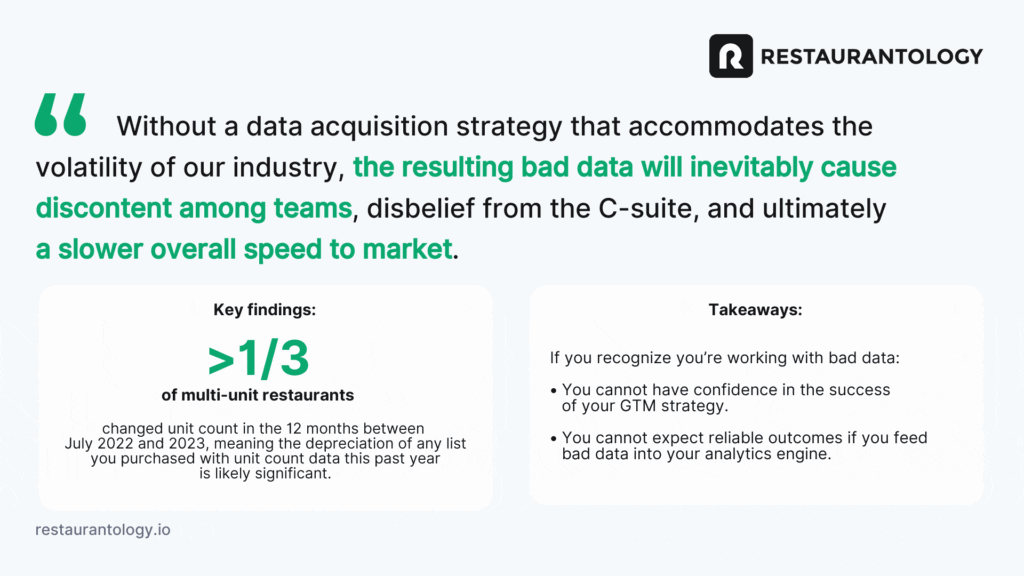Bad data is ruining your GTM

Bad data can have far-reaching effects on go-to-market strategies. So why is there so little priority placed on improving data strategy? Underestimating the negative effects of bad data on business growth could be to blame.
Companies who sell to restaurants have, historically, had a really hard time ‘figuring out’ the market. Each year, typically around August, revenue orgs start their yearly assessment of what’s working, what needs to be tweaked, and eventually put pen to paper drafting future GTM strategies that accommodate for new markets, new products, and everything in between.
An agreement is made on the final deliverable(s)—typically updated account coverage, complete with chase lists, corresponding to recently raised quotas—and then all eyes turn to the CRM as updated ICPs are cast over what is knowingly or unknowingly archaic, static data.
And herein lies the problem.
For many companies, the time between each GTM exercise has little or no concerted effort to validate existing market data, be it once or an ongoing effort. The primary strategies for keeping the CRM aligned to the restaurant industry, an industry known to fall somewhere between transient and turbulent on the volatility spectrum, combine human beings making manual updates with sporadic marketing list imports.
This seems to be restaurant tech’s default state. And while in many instances a company’s size and budget constraints make this the only short-term option, it doesn’t make it right.
Regardless of company size, each attempt to break out of the aforementioned default state typically looks and sounds like this:
- We have a problem: Internal acceptance that existing data is unreliable and incomplete, and therefore insufficient and unactionable.
- Let’s fix it: Agreement that a dedicated market intelligence partner is needed, who is then identified and vetted.
- Wait, we can’t: Stress and realization that tight resources (budget, headcount, time) make ideal-state data acquisition unobtainable.
- Now what: Execs still want a GTM, so it’s crafted using an incomplete or outdated version of the market.
I have single-handedly seen several dozen companies repeat this exact decision making process not once but repeatedly, as in at least once a year, for nearly 2 decades. Watching businesses make the same mistake over and over while each time expecting a different outcome is both the definition of insanity, and the reason we founded Restaurantology 6 years ago.
There has to be a better way. And there is.

The one thing
It’s become my mission to reduce the amount of time it takes to get restaurant tech companies to agree with the following statement:
“Our CRM data does not reflect the market we serve, and it’s negatively affecting our business.”
That’s it. That’s my ONE THING.
As an industry expert committed to helping companies who sell to restaurants, I can assure you that this is the one big domino that, should you commit to knocking it over, begins to relieve a variety of internal pains across numerous departments that can all be attributed to bad data.
Think your existing data is good enough to start drafting a v1 GTM? Hold that thought.
Can’t stop, won’t stop
Consideration: Data has a direct impact on strategy. Or at least it should.
The restaurant landscape is impermanent. And in a world where unit counts and tech stack insights are the primary 2 drivers for SaaS companies selling into the space, keeping up with changes over time can be a real problem.
How much of a problem?
I studied 10,000 multi-unit restaurant concepts for a year to see how much variation there was. The results were pretty shocking.
I found that over one third of multi-unit restaurants changed unit count in the 12 months between July 2022 and 2023, meaning the depreciation of any list you purchased with unit count data this past year is likely significant. Similarly, I found increasing numbers of multi-unit restaurants are choosing to integrate guest-experience-enhancing software into their website, meaning any technographic data you have in your CRM is equally suspect.
If your strategy to keep up with changing unit counts or the accelerating adoption of restaurant tech is using BDRs… you’re toast.
GTM strategy without data is just guessing
Still think you’re ready to start your GTM? Let’s first consider what impact an unvalidated market can have on driving your business.
Since the overarching goal of most GTM strategies is to both uncover and boost revenue, that very revenue is at risk because of poor quality data leading to inaccurate assumptions about the market. Assessing and addressing existing bad data should be increasingly viewed as a strategic imperative to support big initiatives such as segmentation and ABM.
Without a data acquisition strategy that accommodates the volatility of our industry, the resulting bad data will inevitably cause discontent among teams, disbelief from the C-suite, and ultimately a slower overall speed to market.
Remember: inaction regarding data dysfunction has a cost.

Conclusion
If you recognize you’re working with bad data, you cannot really have confidence in the success of your GTM strategy. And, you cannot expect reliable outcomes if you feed bad data into your analytics engine.
If you agree with these two statements, then your path forward should be pretty clear. Find reliable market data, and bring it into the CRM. Fast. The best time to do this was a year ago, but the second best time to do it is starting today.
And as you commit to finally rid your CRM of bad data, I’ll leave you with this parting thought: are you going to fix this just once… or once and for all?
P.S. If when you read “rid your CRM of bad data” your brain immediately jumped to “uh oh, I should probably buy a list” please know that lists are a poor way to acquire data, and a terrible way to do so repeatedly. Our next office hours will hopefully give you some sugar to help that medicine go down.


